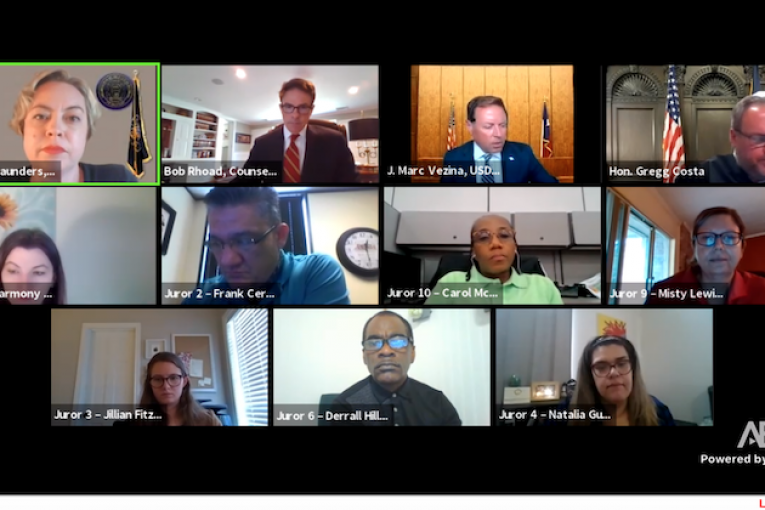

By Sophia Barberini and Derrick Pal
CHICAGO – The American Bar Association, in a webinar panel, highlighted the impacts of COVID-19 on defense attorneys and their clients, explaining that those impacts have resulted in defendants having to “pick [their] constitutional rights, [they] don’t get all of them at the same time.”
After months of courts having to manage pandemic adjustments, the ABA virtual panel, hosted by Indigent Law Defense Attorney, Malia Brink, examined changes to criminal proceedings brought about by COVID-19.
Attorney Brink initiated the panel by asking Alicia Bannon, the Managing Director for the Brennan Center of Justice, to give an overview of what she has witnessed in courts across the country throughout the pandemic.
Director Bannon set the tone for the discussion, asserting, “With the arrival of COVID-19, courts have been building the airplane, as they have been flying it.”
In emphasizing the fluidity and uncertainty of court proceedings across the U.S., Director Bannon acknowledged the differing means by which states have addressed COVID-19 safety precautions  in court.
in court.
She explained, “States have varied in the kinds of measures that they’ve undertaken to preserve safety, you know, things like plexiglass boxes, spreading out juries, see-through masks, things like that.”
Further, Bannon highlighted the extreme backlogging that has resulted from the pandemic, providing New York as an example.
“In New York City, in between March and November 2020, state and federal courts conducted a combined nine criminal trials. During the same time period in 2019, they had eight hundred criminal trials,” she said.
Defense Attorney Zac Hlavaty, from Portland, OR, reiterated Bannon’s point, claiming, “We’ll have 30-40 cases set for trial in a particular week and our court, right now, has capacity for about three trials.”
In an attempt to explain which cases are prioritized, Hlavaty highlighted some of the cases that are making it to trial, “All the cases that are going now are major felonies, so child sex abuse, robberies, kidnaps, serious assaults.”
PD Hlavaty illustrated the implications of this backlogging, asserting that there is “a less strict speedy trial right that the clients can exercise.”
Attorney Brink shifted the conversation, inquiring about the jury selection process.
Public Defender Loren Williams from Alameda County described his jury selection experience in the pandemic and the ramifications of a small jury pool, asserting “summons [were] sent out to 150 to 200 people on one round, and I believe we got 26 people that showed up.
“In a trial that I had on a serious felony, we turned out to have about 30 to 31 jurors to pick from during jury selection, so it’s very problematic and it raises the issue of whether you’re getting a sufficient cross-sample of the community in your trials,” he added.
Moreover, Williams illustrated these consequences in one of his previous trials where he was defending a Black man “and there were no African-American jurors in the entire pool of people that showed up.”
Public Defender Hlavaty also recounted some of his previous jury selection experiences in the pandemic, highlighting his interactions with some pandemic-deniers.
He described, “I’ve also had mixed panels of sort of COVID science deniers. [They would say] ‘like this isn’t a big deal,’ ‘I’m not showing up with a mask.’”
And that led to a discussion surrounding the safety precautions being taken in court.
“There was talk of doing temperature checks and that is sort of half-assed being done,” Hlavaty explained, adding, “They don’t do any sort of COVID tests and are not regularly doing even temperature checks for jurors, attorneys, clients, deputies, anything like that.”
Health safety risks are not the only dangers posed in court cases through the pandemic.
Court proceedings on Zoom, described PD Kelly Villanueva from New Mexico, though less vulnerable to COVID, are vulnerable for security reasons, noting, “People could ‘zoom bomb’ if they wanted to.”
Attorney Brink furthered the discussion, inquiring about the implications of masking and social distancing in court.
PD Hlavaty illustrated the difficulties surrounding human connection in court, claiming “it’s difficult to read the jurors” when they have masks on.
Other members of the panel concurred, explaining the importance of social cues in court, and how masks have impeded the ability to recognize them.
Director Bannon also emphasized the obstructed human connection in court because of the pandemic, particularly between attorney and client, referencing a Texas survey that illustrated, according to defense attorneys, remote and socially distanced trials have been exceptionally “detrimental” to attorney-client relationships.
Based on these findings, Bannon suggested, “Policymakers [and] judges may not be fully attuned to some of the harms that might be manifesting,” adding, given all the pandemic-inflicted changes on court proceedings, “There is a sense right now that [defendants] get to pick [their] constitutional rights, [they] don’t get all of them at the same time.”
Attorney Brink asked if the panel believes any changes will continue post-pandemic.
In response, Director Bannon argued that moving forward, courts must communicate with “a diverse set of stakeholders because [she] think[s] people are going to come at this from different sets of experiences.”
Despite the diverse experiences each member of the panel experienced throughout the pandemic, they all concurred that COVID-19 has resulted in changes in all facets of court proceedings—some for the better, but most, not quite as desirable.
 Sophia Barberini, from San Mateo, CA, is a fourth-year student at UC Berkeley. She is double majoring in Political Science and Legal Studies and hopes to pursue a career in law.
Sophia Barberini, from San Mateo, CA, is a fourth-year student at UC Berkeley. She is double majoring in Political Science and Legal Studies and hopes to pursue a career in law.
Derrick Pal is a fourth-year student at Sacramento State majoring in Criminal Justice and pursuing a minor in Sociology. He is from Elk Grove, California.
To sign up for our new newsletter – Everyday Injustice – https://tinyurl.com/yyultcf9
Support our work – to become a sustaining at $5 – $10- $25 per month hit the link: